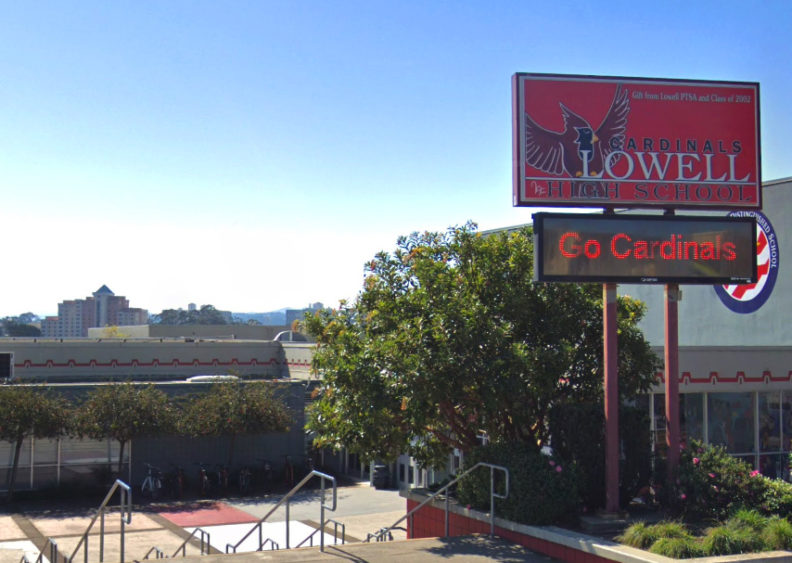School officials Tuesday night heard from opponents and supporters of a controversial proposal to temporarily change admission requirements at one of San Francisco’s most elite high schools.
In the proposal, Lowell High School would temporarily suspend merit-based admissions for the Class of 2025 and would operate under the lottery system used by other schools in the district, with the exception of Ruth Asawa School of the Arts.
School officials say the proposed shift is necessary because the Covid-19 pandemic impacted how students were tested and graded at the end of the last academic year. Students were given “Credit/No Credit” for courses, which eliminated letter grades and grade point averages for the spring term.
Additionally, Gov. Gavin Newsom suspended the Smarter Balanced Assessment Consortium (SBAC) test in the spring. Normally, test scores from the seventh grade and first semester of eighth grade are considered in conjunction with GPAs and essays as a way to determine if students are qualified to attend Lowell High.
Parents and alumni called in during the public comment portion of Tuesday’s meeting, many expressing disappointment in the short notice given by the district. The San Francisco Unified School District posted an announcement on their website just five days ago on Oct. 9.
Opponents urged the Board of Education to seek other alternatives to the lottery system, suggesting grades and test scores be reviewed from prior semesters. An online petition calling on the district to consider routes other than random admission had gained 5,130 signatures by Wednesday evening.
Assemblyman Phil Ting, D-San Francisco, also spoke out during the meeting and asked the board to reconsider its proposal, saying:
“I think it’s not entirely fair for the students that have been preparing really for years, frankly, for this admissions process. It really takes away from their hard work and their chance to apply for Lowell.”
Tweet this!
Tim Turner, a 1964 Lowell High graduate, worried about the impact on students who are not prepared for the intensity of Lowell curriculum.

Turner said:
“There’s the law of unintended consequences you’re looking at putting a bunch of children, some of which come from the lowest performing schools, into the highest performing schools with the expectation that somehow they’re going to be able to survive that.”
Tweet this!
Jessi Yu, student body president at Lowell, said students should not strive for good grades with the sole purpose of being accepted into Lowell. Yu added:
“A lot of people also mentioned that one of the main reasons and only sources of motivation for good grades is an acceptance from Lowell, but if your motivation is defined by an acceptance into a school, you clearly don’t value education or learning.”
Tweet this!
Yu suggested that instead of “propping up Lowell,” the school district should provide the same resources and “academic rigor” to all schools in the district.
Yu said:
“I think this resolution is a huge stepping stone for achieving the type of equity that Lowell and SFUSD has been looking for.”
Tweet this!
Both sides received an hour to give public comment, but there were interruptions between speakers and during comments from student board member Shavonne Hines-Foster.
Board members weighed in on the proposal but will not vote until the Oct. 20 meeting. Some board members were displeased with the tone of some of the public comments.
Board member Rachel Norton said:
“I’m just really, really overcome by the ugliness of what I heard from people who supposedly care about what we’re doing and care about our system.”
Tweet this!
On the short notice issue, Norton said the board could have notified people earlier in the summer, but added:
“I don’t think this was the most urgent problem that we needed the staff to solve over the last six months, so you can blame us the board for not getting this out earlier. That’s fine, I’ll take that on.”
Tweet this!
Hines-Foster questioned where these concerned parents and alumni where four years ago when students walked out of class to what they viewed as racism at the high school.
The public will again have the chance to comment during the board’s Oct. 20 meeting when a vote is expected to take place.
Jerold serves as a reporter and San Francisco Bureau Chief for SFBay covering transportation and occasionally City Hall and the Mayor's Office in San Francisco. His work on transportation has been recognized by the San Francisco Press Club. Born and raised in San Francisco, he graduated from San Francisco State University with a degree in journalism. Jerold previously wrote for the San Francisco Public Press, a nonprofit, noncommercial news organization. When not reporting, you can find Jerold taking Muni to check out new places to eat in the city.
